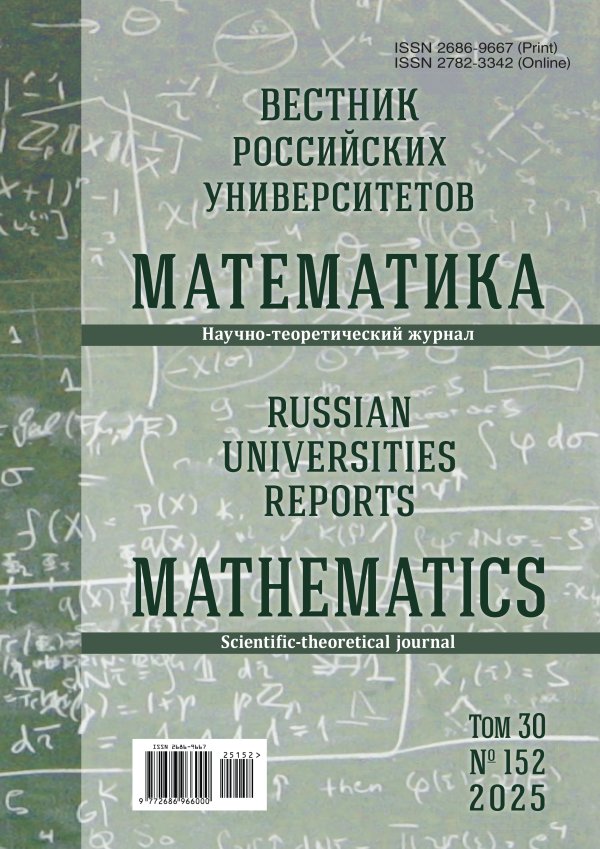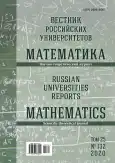Том 25, № 132 (2020)
Статьи
Некоторые вопросы анализа отображений метрических и частично упорядоченных пространств
Аннотация
Рассматриваются вопросы существования решений уравнений и достижимости минимальных значений функций. Все полученные утверждения объединены идеей существования для любого приближения к искомому решению или к точке минимума улучшенного приближения. Установлена взаимосвязь между рассматриваемыми задачами в метрических и частично упорядоченных пространствах. Также демонстрируется, как из полученных утверждений выводятся некоторые известные результаты о неподвижных точках и точках совпадения отображений метрических и частично упорядоченных пространств. Далее на основании аналогий в доказательствах всех полученных утверждений предлагается способ получения подобных результатов из доказываемой теоремы о выполнимости предиката следующего вида. Пусть X, ≤ - частично упорядоченное пространство, отображение Φ:X× X→ 0, 1 удовлетворяет следующему условию: для любого x∈X существует x ' ∈X такой, что x ' ≤x и Φx ' ,x =1. Рассматривается предикат F(x)=Φ(x,x) , получены достаточные условия его выполнимости, т. е. существования решения уравнения F(x)=1 . Этот результат был анонсирован в [Жуковская Т.В., Жуковский Е.С. О выполнимости предикатов, заданных на частично упорядоченных // Колмогоровские чтения. Общие проблемы управления и их приложения (ОПУ-2020). Тамбов, 2020, 34-36].
Вестник российских университетов. Математика. 2020;25(132):345-358
 345-358
345-358


Минимаксные дифференциальные игры с последействием
Аннотация
В статье на основе методологии i -гладкого анализа рассматривается минимаксная позиционная дифференциальная игра с последействием. В конечномерном (ОДУ) случае для минимаксной дифференциальной игры разрешающие смешанные стратегии могут быть построены с использованием метода динамического программирования. В статье показано, что методология i -гладкого анализа позволяет полностью аналогично конечномерному случаю строить контрстратегии. Причем, как характерно для применения i -гладкого анализа, в случае отсутствия последействия, все результаты статьи переходят с точностью до обозначений в соответствующие результаты конечномерной теории позиционных дифференциальных игр.
Вестник российских университетов. Математика. 2020;25(132):359-369
 359-369
359-369


Элементы аналитического конструктора решений в классе задач управления по быстродействию с целевым множеством с разрывной кривизной границы
Аннотация
Рассмотрена плоская задача управления по быстродействию с круговой индикатрисой и целевым множеством с гладкой границей, имеющей конечные разрывы производных второго порядка от координатных функций. Изучены псевдовершины - особые точки границы цели, порождающие сингулярность у функции оптимального результата. Для нестационарных псевдовершин с разрывной кривизной найдены односторонние маркеры, значения которых нужны при аналитическом и численном построении ветвей сингулярного множества. Доказано, что маркеры лежат на границе спектра - области возможных значений. Один из них равен нулю, другой принимает несобственное значение -∞ . При их вычислении применены асимптотические разложения нелинейного уравнения, выражающего условие трансверсальности. На основе маркеров также получены точные формулы крайних точек ветвей сингулярного множества. Предъявлен пример задачи управления, в котором найденных с помощью развиваемых методов конструктивных элементов (псевдовершины, ее маркеров и крайней точки сингулярного множества) оказывается достаточно, чтобы на всей области рассмотрения построить в явном аналитическом виде сингулярное множество и функцию оптимального результата.
Вестник российских университетов. Математика. 2020;25(132):370-386
 370-386
370-386


Новый метод численного решения линейного интегрального уравнения Фредгольма на большом интервале
Аннотация
Традиционное численное решение линейного интегрального уравнения Фредгольма на большом интервале делится на два этапа: первый дискретизация, второй использование итерационной схемы для приближения к решению алгебраической системы большой размерности (полученной на первом этапе). В этой статье мы предлагаем новый метод, основанный на построении обобщения итерационной схемы, которая адаптирована к системе линейных ограниченных операторов, при этом мы не дискретизируем всю систему, а только ее диагональную часть. Рассматриваемая система строится путем преобразования исходного интегрального уравнения. В качестве дискретизации мы рассматриваем метод интегрирования произведения, а в качестве итерационной схемы итерационный метод Гаусса-Зайделя. Мы также анализируем сходимость этого нового метода. Численные тесты показывают его эффективность.
Вестник российских университетов. Математика. 2020;25(132):387-400
 387-400
387-400


Дифференциальные игры преследования дробного порядка с нелинейными управлениями
Аннотация
Статья посвящена проблемам распространения результатов и методов теории дифференциальных игр и оптимального управления на системы дробного порядка. Исследование мотивировано многочисленными применениями дробного исчисления в задачах управления промышленными объектами, химическими и биохимическими установками и др. В статье рассматривается задача преследования в играх, представленных нелинейными дифференциальными уравнениями произвольного дробного порядка в смысле Капуто. Для исследования данной задачи преследования мы используем подход, аналогичный методу Л.С. Понтрягина, разработанному для линейных дифференциальных игр целых порядков. В работе получены новые достаточные условия для решения задачи преследования в изучаемом классе игр. Доказано, что при выполнении этих условий можно завершить игру в течение определенного ограниченного промежутка времени. При решении задачи преследования нами также использовалось представление решения дифференциального уравнения через обобщенные матричные функции.
Вестник российских университетов. Математика. 2020;25(132):401-409
 401-409
401-409


О дифференциальных уравнениях в банаховых алгебрах
Аннотация
Рассматриваются линейные дифференциальные уравнения высшего порядка с постоянными коэффициентами в банаховых алгебрах (это есть прямое обобщение матричных дифференциальных уравнений высшего порядка). Изложение опирается на высшую алгебру, дифференциальные уравнения и функциональный анализ. Полученные результаты могут быть использованы при изучении матричных уравнений, в теории малых колебаний в физике и теории возмущений в квантовой механике. Изложение основано на оригинальных исследованиях авторов.
Вестник российских университетов. Математика. 2020;25(132):410-421
 410-421
410-421


Вольтерровы функциональные уравнения в проблеме устойчивости существования глобальных решений распределенных управляемых систем
Аннотация
Ранее автором была предложена довольно общая форма описания управляемых начально-краевых задач (УНКЗ) с помощью вольтерровых функциональных уравнений (ВФУ) вида z t =f t, A z t , vt , t≡ t 1 ,⋯, t n ∈ Π⊂ Rn , z∈ L p m ≡ L p Πm , где f.,.,. : Π× Rl ×Rs →Rm ; v(.)∈D⊂ L k s - управление; A:L pm→L ql - линейный оператор, вольтерров на некоторой системе T подмножеств Π в том смысле, что для любого H∈T сужение A[z] H не зависит от значений z Π\\H; p,q,k∈1, +∞ . Это определение вольтерровости - многомерное обобщение известного определения А.Н. Тихонова функционального оператора типа Вольтерра. К подобным уравнениям естественным образом (обращением главной части) приводятся разнообразные УНКЗ для нелинейных эволюционных уравнений (параболических, гиперболических, интегро-дифференциальных, с разного рода запаздываниями и др.). Переход к эквивалентному ВФУ-описанию УНКЗ адекватен многим проблемам распределенной оптимизации. В частности, автором была предложена опирающаяся на это описание схема получения конструктивных достаточных условий устойчивости (при возмущении управления) существования глобальных решений (УСГР) УНКЗ. Схема использует продолжение локальных решений ВФУ (то есть решений на множествах H∈T ) вдоль упорядоченной по вложению конечной цепочки множеств H 1 ⊂ H 2 ⊂…⊂ H k-1 ⊂ H k≡ Π системы T . При этом используется опирающаяся на принцип сжимающих отображений специальная теорема существования локальных решений. В случае p=q=k=∞ при естественных предположениях возможность применения этого принципа обеспечивается тем, что оператор правой части F vz . (t)≡f(t,Az t , v(t)) удовлетворяет операторному условию Липшица с квазинильпотентным «оператором Липшица». Это позволяет, пользуясь хорошо известными результатами функционального анализа, ввести в пространстве L ∞m( H ) такую эквивалентную обычной норму, в которой оператор правой части будет сжимающим. В общем случае 1≤p, q, k ≤∞, охватывающем существенно более широкий круг УНКЗ, оператор правой части подобному операторному условию Липшица, вообще говоря, не удовлетворяет. В этом случае введение требуемой для применения принципа сжимающих отображений эквивалентной нормы пространства L pm( H ) обеспечивает доказанная ранее автором теорема об эквивалентной норме , опирающаяся на введенное им понятие суперравностепенной квазинильпотентности семейства линейных операторов, действующих в банаховом пространстве. В данной статье показано, как эта теорема может быть применена для получения достаточных условий УСГР ВФУ в указанном случае.
Вестник российских университетов. Математика. 2020;25(132):422-440
 422-440
422-440


Управляемые дифференциальные уравнения с параметром и с многозначными импульсными воздействиями
Аннотация
Исследуется задача Коши для управляемой дифференциальной системы с параметром - элементом некоторого метрического пространства Ξ , содержащей фазовые ограничения на управление. Предполагается, что в заданные моменты времени t k , k = 1, 2,…, p, решение x непрерывно слева и терпит разрыв, величина которого x t k +0 -x( t k ) принадлежит некоторому непустому компакту пространства R n . Введены понятия допустимой пары этой управляемой импульсной системы. Рассмотрены вопросы продолжаемости допустимых пар. Даны определения априорной ограниченности и априорной ограниченности в совокупности на заданном множестве S×K (S⊂ R n - множество начальных значений, K⊂ Ξ- множество значений параметра) множества фазовых траекторий. Доказано, что если в какой-то точке x 0 ,ξ ∈ R n × Ξ множество фазовых траекторий априорно ограничено, то оно будет априорно ограничено и в некоторой окрестности этой точки.
Вестник российских университетов. Математика. 2020;25(132):441-447
 441-447
441-447









